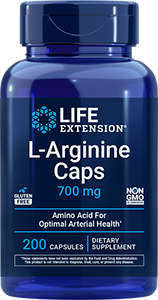
10 L-Arginine Benefits: How to Supplement
Published: April 2022
Why should athletes have all the fun? L-arginine is a popular supplement among the weightlifting crowd, but did you know that this amino acid benefits everything from heart and nervous health to male sexual performance? That's because one of L-arginine's key benefits is that it produces nitric oxide, a molecule that increases blood circulation, helping to deliver nutrients and oxygen to every part of your body more effectively.
Let's talk all about what arginine is, how to get more of it, and how you might benefit from L-arginine supplements.
What is L-arginine?
L-arginine is an amino acid, and your body uses it to make protein—just like l-glutamine and L-tyrosine. It's the most prominent and active form of arginine in your system.
In healthy adults, L-arginine is a nonessential amino acid, which means that your body is able to produce some of it on its own. Conversely, your body cannot produce essential amino acids, so you must get them elsewhere, from supplementation, diet, or a combination of the two. And with semi-essential amino acids, you want to get as much from your diet as possible, so that your body can avoid using other amino acids to synthesize it.
L-arginine and nitric oxide
In addition to building protein, L-arginine is a precursor to nitric oxide, which your body needs to maintain elasticity in the arteries and blood vessels. Having enough nitric oxide is important for healthy blood flow and supporting already-healthy blood pressure, for normal sexual function in men, and exercise performance.
L-arginine: 10 health benefits

What is L-arginine good for? Because of its role in protein and nitric oxide production, it offers a number of potential benefits, without much documentation of any side effects. Let's dive in!
1. Bodybuilding
Looking for a boost for your next sweat sesh? You might find arginine helpful. Research suggests that arginine supplementation can support your aerobic and anaerobic capacity. This is because arginine produces nitric oxide, which relaxes your blood vessels and thus encourages healthy blood flow. Ultimately, with L-arginine supplementation, you might be able to train harder and longer during moderate-intensity exercise.
Psst! If you're an athlete, you might also find taurine beneficial.
2. Heart health
Ready to get pumped about a healthier heart? Since it can improve blood flow and supports blood vessel size and health, L-arginine might be beneficial for your cardiovascular health! The Mayo Clinic says that it might help relieve occasional discomfort.
3. Already-healthy blood pressure
No "pressure" or anything, but are you doing everything you can to keep your already-healthy BP within an optimal range? If you have already-healthy blood pressure, an L-arginine supplement can help you maintain it and continue to promote healthy endothelial function and vascular tone. Preclinical studies suggest that arginine supplementation can help especially if you're sensitive to salt. This is why L-arginine is a common supplement for supporting already-healthy blood pressure.
4. Testosterone: does L-arginine support testosterone levels?
Testosterone is a key hormone for men, and levels tend to dip with age—affecting everything from muscle strength to sexual response. If you want to support healthy testosterone levels, L-arginine supplementation might help you "stay in the game." Animal studies reveal that arginine can help promote healthy testosterone levels. More specifically, it can promote secretion of luteinizing hormone (LH), which the testes use to produce testosterone.
5. Sexual health: does L-arginine support libido?
Looking for a boost in the bedroom? One meta-analysis of 47 clinical trials found that arginine was one of the few ingredients to promote healthy sexual function. L-arginine supplementation can be a safe and effective way to boost your libido. Combining L-arginine with French maritime bark extract helps promote male blood flow, necessary for a healthy sexual response.
6. Already-healthy blood sugar levels
Sweet news: clinical studies have found that arginine can support healthy glucose metabolism—meaning how your body is able to use sugar (a source of fuel). L-arginine supplementation also can help you maintain a healthy weight.
7. Kidney function
You might not think much about your kidneys...but you should! This organ is important, and the right nutrition can make a difference. One preclinical study found that L-arginine supplementation can support kidney function and can even support a healthy inflammatory response.
8. Immune benefits
Keep those natural defenses in fighting condition! Sufficient levels of arginine in your body can support a healthy immune system, by keeping your immune cells healthy and fully functioning. This means that ultimately, your body will be better able to fight off immune challenges.
9. Antioxidant
Antioxidants protect your cells from stress due to free radicals, and are considered crucial to any anti-aging regimen. Preclinical data suggest that arginine supplementation can stimulate the production of glutathione, which is one of your body's primary antioxidants (and is also available as a supplement). It can also encourage the expression of genes that are related to antioxidant defense.
10. Nervous system health
How you think and behave has a lot to do with a protein called vasopressin, which includes arginine in its makeup. Vasopressin acts as a neurotransmitter in your brain, and it helps to support your cognition and behavior. In addition to promoting healthy cognitive function, L-arginine can also help protect the brain against oxidative stress.
Explore Our Best Heart Health Supplements
How can I get enough L-arginine?
There is no recommended dietary allowance (RDA) for arginine since the body can produce it on its own. However, you should still be sure to include foods in your diet that are rich in L-arginine. (More on that next!) Arginine supplementation can also give you a nice boost.
Foods that contain L-arginine

Good news—there are plenty of nutritious and delicious foods you can add to your diet that contain L-arginine. And specifically, a protein-rich diet is what you're aiming for.
Turkey:
One turkey breast has 16 g of arginine.Chicken:
One cup of chicken contains 2.79 g.Beef:
One pound of cooked beef has about 4.1 g of arginine. (Do keep in mind, though, that beef contains more unhealthy fats than turkey and chicken.)Nuts, seeds, and whole grains:
One cup of dried pumpkin seeds contains 6.9 g of arginine.Dairy products:
Think milk, yogurt, and cheese.
L-arginine supplements: who should take L-arginine?
L-arginine supplements are especially common among athletes, but anyone who wants to enjoy the specific beneficial effects that we've discussed will find an L-arginine supplement useful.
Capsule vs. powder l-arginine supplementation
If you'd rather not swallow yet another capsule or tablet, you can find L-arginine as a tasty powder that you can mix into your water bottle.
L-arginine vs arginine: what are the differences?
"Arginine" and "L-arginine" are often used interchangeably and used to refer to the same thing. However, there is another kind: D-arginine. In fact, all amino acids except glycine have an L and D form. They're essentially mirror images of each other, and we refer to them as "enantiomers."
Do L-arginine supplements really work?
Yes! Studies report positive results for individuals who take L-arginine supplements vs. a placebo group.
Is it safe to take L-arginine supplements every day? Dose recommendations & side effects
Arginine is well-tolerated and can be safely taken with minor side effects (at most) for up to three months, as long as you follow the dose recommendations on the bottle; 700 mg is considered an effective dose. If you're ever unsure of what your dose should be, check the nutrition label of your supplement, and speak with your healthcare provider if you want to confirm. And if you do experience side effects, check with your doctor before continuing usage.
Best time to take L-arginine supplements
This mostly comes down to personal preference. Athletes like to take them before training, often in a pre-workout drink. If you take this route, aim to consume it 60-90 minutes before you exercise. However, you can take arginine whenever you'd like.
Should I take L-arginine supplements with food?
Typically, you'll want to take any amino acid supplements on an empty stomach, because your body will be able to absorb them better.
Arginine and ornithine: are they better together?
Yes, and here's why. L-ornithine is another nonessential amino acid that your body can make from arginine and vice-versa. Both of these amino acids help your cells convert ammonia into urea, which your kidneys are able to safely excrete. L-ornithine is also used to produce the amino acid L-proline, which is needed for collagen synthesis to help maintain youthful skin. So, since they work hand in hand, supplementing with arginine and ornithine together can be beneficial.
References
- Bruce, Debra Fulghum, PhD. "Arginine: Heart Benefits and Side Effects." WebMD, https://www.webmd.com/heart/arginine-heart-benefits-and-side-effects
- Cieri-Hutcherson, NE et al. "Systematic Review of l-Arginine for the Treatment of Hypoactive Sexual Desire Disorder and Related Conditions in Women." Pharmacy, March 2021. https://www.ncbi.nlm.nih.gov/pmc/articles/PMC8103282/
- Gambardella, Jessica et al. "Arginine and Endothelial Function." Biomedicines, August 2020, https://www.ncbi.nlm.nih.gov/pmc/articles/PMC7460461/
- Hu, Shengdi et al. "L-Arginine Modulates Glucose and Lipid Metabolism in Obesity and Diabetes." Curr Protein Pept Sci., 2017, https://pubmed.ncbi.nlm.nih.gov/27356939/
- Jia, Xiao et al. "L-Arginine alleviates the testosterone reduction in heat-treated mice by upregulating LH secretion, the testicular antioxidant system and expression of steroidogenesis-related genes." Reprod Fertil Dev., June 2020, https://pubmed.ncbi.nlm.nih.gov/32586418/
- Khalaf, David et al. "The Effects of Oral L-Arginine and L-Citrulline Supplementation on Blood Pressure." Nutrients, July 2019, https://www.mdpi.com/2072-6643/11/7/1679
- Kuchakulla, Manish et al. "A systematic review and evidence-based analysis of ingredients in popular male testosterone and erectile dysfunction supplements." International Journal of Impotence Research, May 2020, https://www.nature.com/articles/s41443-020-0285-x
- Liang, Mingcai et al. "l-Arginine induces antioxidant response to prevent oxidative stress via stimulation of glutathione synthesis and activation of Nrf2 pathway." Food Chem Toxicol., May 2018, https://pubmed.ncbi.nlm.nih.gov/29577948/
- Líndez, Adrià-Arnau Martí I et al. "Arginine-dependent immune responses." Cell Mol Life Sci., July 2021, https://pubmed.ncbi.nlm.nih.gov/34037806/
- Marchinkowska, Anna B. et al. "Arginine-vasopressin, synaptic plasticity and brain networks." Curr Neuropharmacol., February 2022, https://pubmed.ncbi.nlm.nih.gov/35193483/
- McRae MP. "Therapeutic Benefits of l-Arginine: An Umbrella Review of Meta-analyses," Journal of chiropractic medicine, September, 2016. https://www.ncbi.nlm.nih.gov/pmc/articles/PMC5021928/
- Tanuseputero, Sharon Angela. "Intravenous Arginine Administration Downregulates NLRP3 Inflammasome Activity and Attenuates Acute Kidney Injury in Mice with Polymicrobial Sepsis." Mediators Inflamm., May 2020, https://pubmed.ncbi.nlm.nih.gov/32454788/
- Viribay, Aitor et al. "Effects of Arginine Supplementation on Athletic Performance Based on Energy Metabolism: A Systematic Review and Meta-Analysis." Nutrients, May 2020, https://pubmed.ncbi.nlm.nih.gov/32370176/
- "Amino acids." MedlinePlus, https://medlineplus.gov/ency/article/002222.htm
- "D-Arginine." National Library of Medicine, https://pubchem.ncbi.nlm.nih.gov/compound/D-Arginine
- "Top Foods High in Arginine." Nourish by WebMD, October 2020, https://www.webmd.com/diet/top-foods-high-in-arginine





